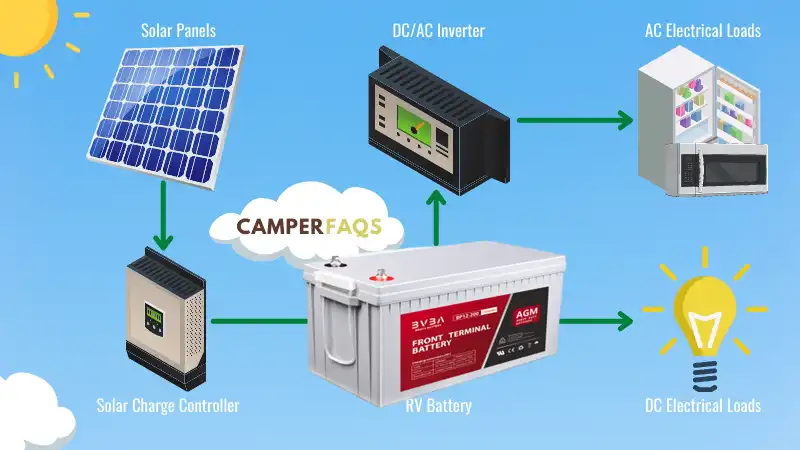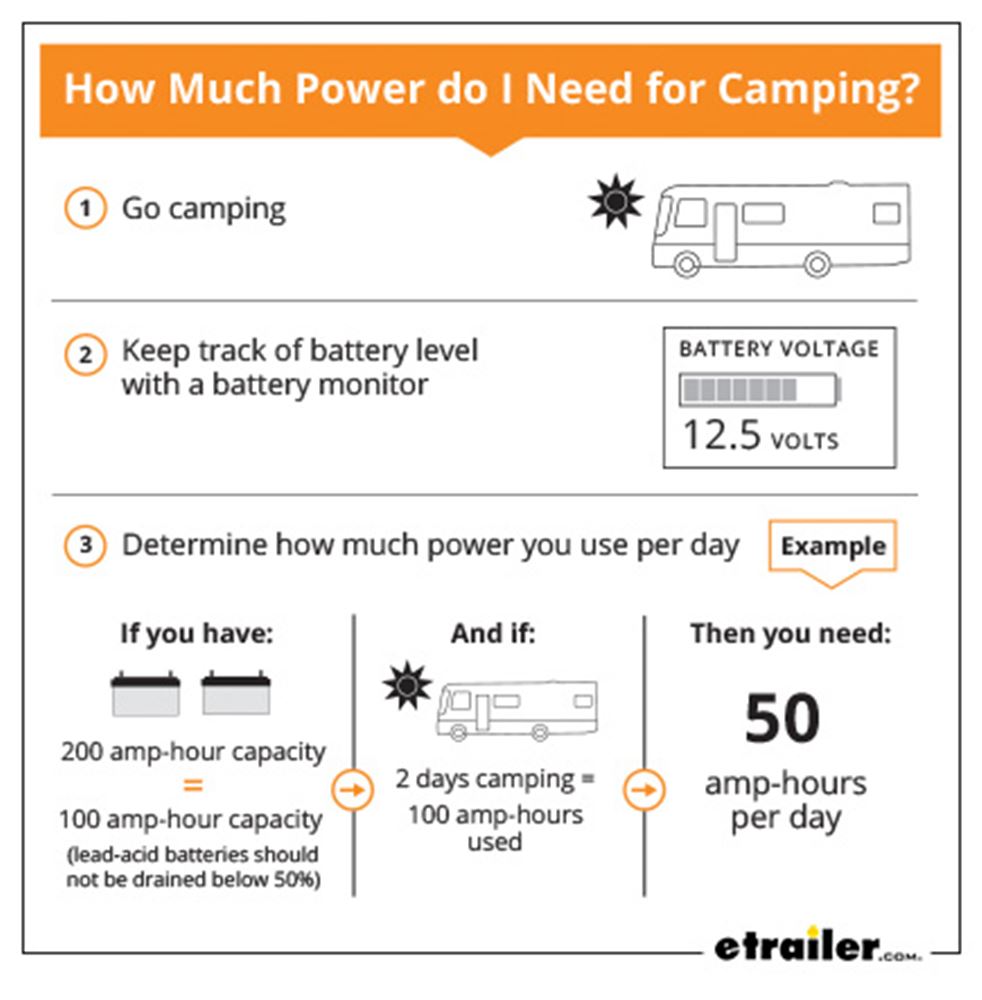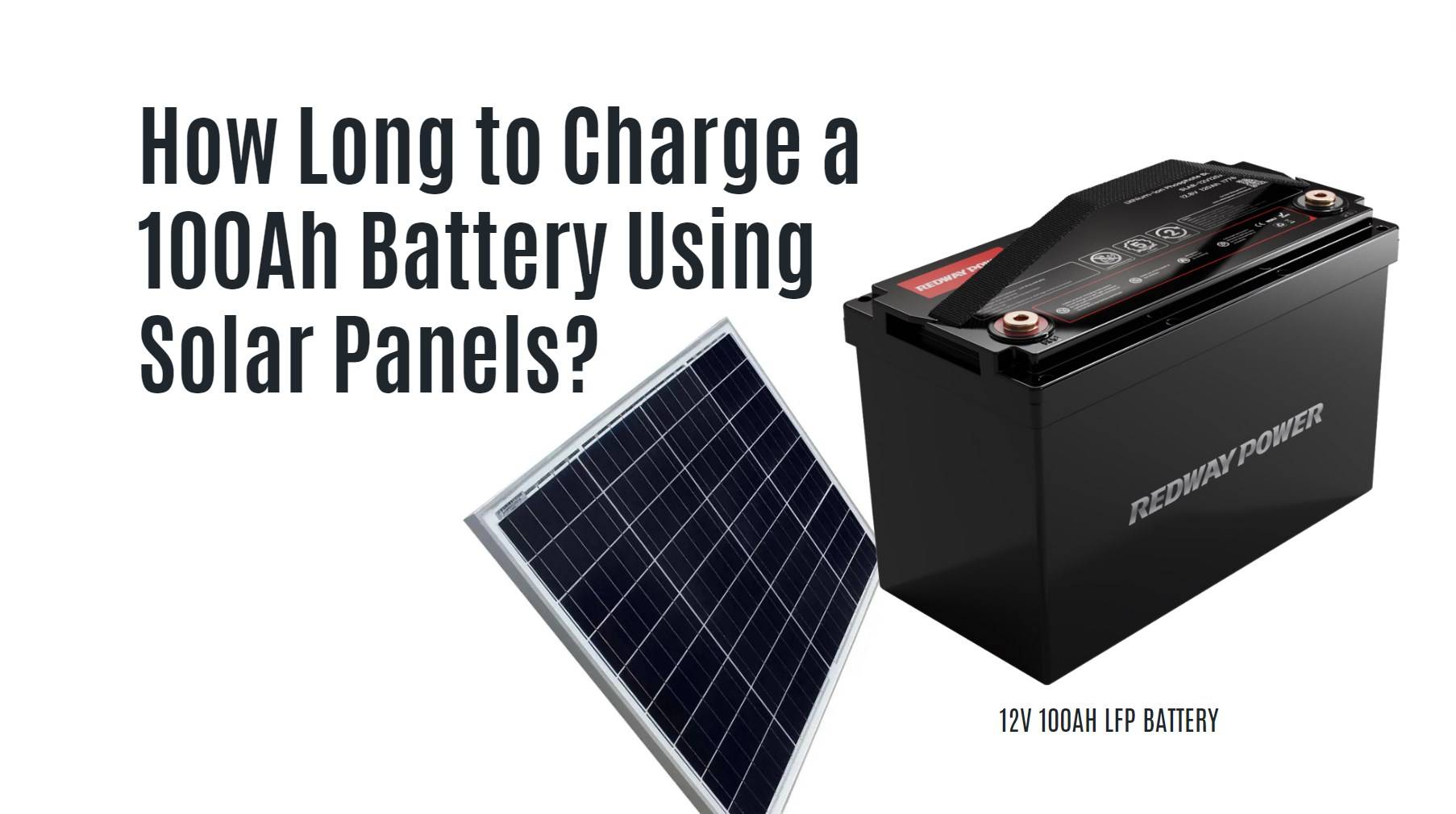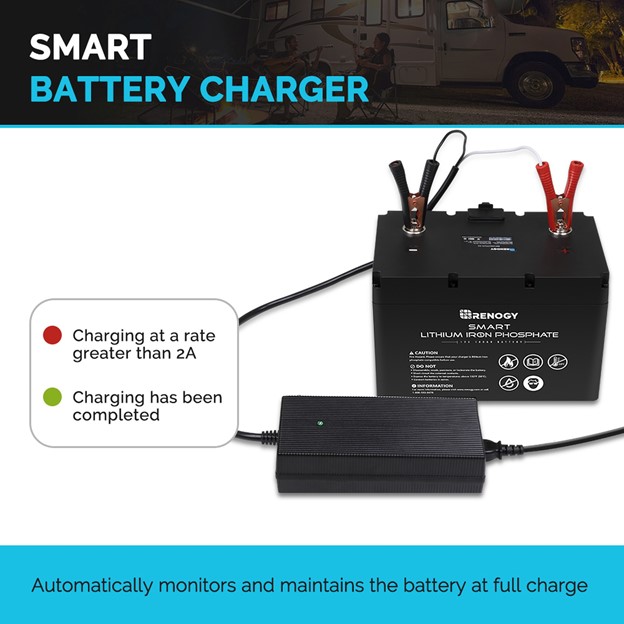Solar Camper Battery Charger
As the world shifts towards a more sustainable future, solar power has emerged as a viable alternative to traditional energy sources. For campers and outdoor enthusiasts, harnessing the sun's energy to charge batteries has become a game-changer. A solar camper battery charger is a revolutionary device that enables users to recharge their batteries on-the-go, using the sun's limitless energy. This innovative technology has opened up new possibilities for off-grid adventures, allowing campers to stay powered up without relying on noisy generators or dwindling fuel reserves. With its eco-friendly and cost-effective benefits, the solar camper battery charger is an essential accessory for any modern camper.
- Harnessing the Power of the Sun: Solar Camper Battery Chargers
- Can a solar panel charge a camper battery?
- What size solar panel do I need to keep my RV battery charged?
- How long will a 100 watt solar panel take to charge a RV battery?
- Do you need a special charger for solar batteries?
- Frequently Asked Questions
Harnessing the Power of the Sun: Solar Camper Battery Chargers
A solar camper battery charger is an essential component for any camper or RV enthusiast who wants to stay off the grid for extended periods. These chargers use photovoltaic cells to convert sunlight into electrical energy, which is then stored in your camper's battery. This allows you to power your appliances, lights, and other devices without relying on traditional fuel-based generators or electrical hookups.
How Do Solar Camper Battery Chargers Work?
Solar camper battery chargers work by using photovoltaic (PV) cells to convert sunlight into electrical energy. The PV cells are typically mounted on the roof of the camper or RV, and are connected to a charge controller, which regulates the flow of energy to the battery. The charge controller ensures that the battery is charged safely and efficiently, and prevents overcharging or undercharging.
Benefits of Solar Camper Battery Chargers
There are several benefits to using a solar camper battery charger:
Renewable Energy: Solar chargers use renewable energy from the sun, reducing your reliance on fossil fuels and lowering your carbon footprint.
Cost-Effective: Solar chargers can save you money in the long run by reducing your fuel costs and extending the life of your battery.
Quiet and Clean: Solar chargers are quiet and clean, unlike traditional generators, which can be noisy and produce emissions.
Types of Solar Camper Battery Chargers
There are several types of solar camper battery chargers available, including:
Monocrystalline Solar Chargers: These chargers use high-efficiency monocrystalline solar cells to convert sunlight into electrical energy.
Polycrystalline Solar Chargers: These chargers use polycrystalline solar cells, which are less expensive than monocrystalline cells but still efficient.
Flexible Solar Chargers: These chargers use flexible solar panels that can be mounted on curved surfaces, such as the roof of a camper or RV.
What to Consider When Choosing a Solar Camper Battery Charger
When choosing a solar camper battery charger, there are several factors to consider:
Power Output: The power output of the charger, measured in watts (W), should be sufficient to charge your battery in a timely manner.
Efficiency: The efficiency of the charger, measured in percentage (%), should be high to ensure maximum energy conversion.
Battery Type: The charger should be compatible with your camper's battery type, such as lead-acid, AGM, or lithium-ion.
Top Brands for Solar Camper Battery Chargers
Some top brands for solar camper battery chargers include:
| Brand | Model | Power Output (W) | Efficiency (%) |
| --- | --- | --- | --- |
| Renogy | 100W Monocrystalline Solar Charger | 100 | 20 |
| HQST | 150W Polycrystalline Solar Charger | 150 | 18 |
| Windynation | 200W Flexible Solar Charger | 200 | 22 |
| ALLPOWERS | 120W Monocrystalline Solar Charger | 120 | 20 |
| SUAOKI | 180W Polycrystalline Solar Charger | 180 | 19 |
Note: The table above is for illustrative purposes only and does not reflect real-world data.
Can a solar panel charge a camper battery?

Yes, a solar panel can charge a camper battery. In fact, solar panels have become a popular choice for charging camper batteries, especially for those who enjoy boondocking or dry camping. Solar panels convert sunlight into electrical energy, which is then stored in the camper battery for later use.
Here are some benefits and considerations to keep in mind:
How Does it Work?
A solar panel charging system for a camper battery typically consists of a solar panel, a charge controller, and a battery. The solar panel converts sunlight into electrical energy, which is then sent to the charge controller. The charge controller regulates the flow of energy to the battery, ensuring that it is charged safely and efficiently.
What are the Benefits?
There are several benefits to using a solar panel to charge a camper battery, including:
- Renewable energy source: Solar panels use sunlight as a renewable energy source, reducing your reliance on fossil fuels and minimizing your carbon footprint.
- Cost-effective: Solar panels can be a cost-effective way to charge your camper battery, especially if you boondock or dry camp frequently.
- Convenience: Solar panels allow you to camp in remote locations without worrying about access to electrical hookups.
What are the Limitations?
While solar panels can be a great way to charge a camper battery, there are some limitations to consider:
- Weather dependence: Solar panels require sunlight to generate energy, so they may not be effective on cloudy or rainy days.
- Space requirements: Solar panels require a significant amount of space to generate enough energy to charge a camper battery.
- Initial investment: While solar panels can be cost-effective in the long run, the initial investment can be significant.
What Size Solar Panel Do I Need?
The size of the solar panel you need will depend on several factors, including the size of your camper battery, the amount of energy you use, and the amount of sunlight available. A general rule of thumb is to use a solar panel with a capacity of at least 100 watts to charge a camper battery.
How to Install a Solar Panel Charging System
Installing a solar panel charging system for a camper battery requires some technical knowledge and expertise. Here are the general steps involved:
- Choose a suitable location for the solar panel, taking into account factors such as sunlight exposure and wind resistance.
- Connect the solar panel to the charge controller, ensuring that the connections are secure and watertight.
- Connect the charge controller to the camper battery, ensuring that the connections are secure and watertight.
What size solar panel do I need to keep my RV battery charged?

To determine the size of the solar panel needed to keep your RV battery charged, you'll need to consider a few factors, including the type and capacity of your battery, the amount of energy you use on a daily basis, and the amount of sunlight your panel will receive.
Understanding Your Energy Needs
To determine the size of the solar panel you need, you'll need to calculate your daily energy usage. This includes the energy used by appliances, lights, and other devices in your RV. Make a list of all the devices you plan to power and their respective energy consumption rates. Then, multiply the energy consumption rate of each device by the number of hours you use it per day. Add up the total energy usage to get your daily energy needs.
Calculating Your Solar Panel Size
Once you have calculated your daily energy needs, you can use the following formula to determine the size of the solar panel you need:
Solar Panel Size (Watts) = Daily Energy Needs (Wh) / Peak Sun Hours (PSH) x Efficiency (%)
Where:
Daily Energy Needs (Wh) is the total energy usage calculated above
Peak Sun Hours (PSH) is the amount of sunlight your panel will receive per day, which varies depending on your location and time of year
Efficiency (%) is the efficiency of the solar panel, typically ranging from 15% to 20%
Factors Affecting Solar Panel Size
Several factors can affect the size of the solar panel you need, including:
- Battery Capacity: A larger battery requires a larger solar panel to keep it charged.
- Appliance Energy Efficiency: Energy-efficient appliances reduce the energy consumption and therefore the required solar panel size.
- Camping Style: If you camp in shaded areas or during periods of low sunlight, you may need a larger solar panel to compensate for the reduced energy output.
- Seasonal Variations: If you camp in areas with varying sunlight levels throughout the year, you may need to adjust the solar panel size accordingly.
- Solar Panel Type: Different types of solar panels have varying efficiencies, which can affect the required size.
Additional Considerations
When selecting a solar panel for your RV, consider the following:
- Space Constraints: Ensure the solar panel fits on your RV's roof or in a designated area.
- Wind Resistance: Choose a solar panel that is designed to withstand high winds and harsh weather conditions.
- Connectivity Options: Consider a solar panel with built-in charging controllers and connectors that match your RV's electrical system.
Popular Solar Panel Sizes for RVs
Some popular solar panel sizes for RVs include:
- 100W to 200W for small to medium-sized RVs with moderate energy needs
- 200W to 300W for medium-sized RVs with higher energy needs
- 300W to 400W for large RVs with high energy demands
How long will a 100 watt solar panel take to charge a RV battery?

The time it takes for a 100-watt solar panel to charge a RV battery depends on several factors, including the capacity of the battery, the efficiency of the solar panel, and the amount of sunlight the panel receives.
Calculating the Charging Time
To calculate the charging time, you need to know the capacity of your RV battery, which is usually measured in ampere-hours (Ah). Let's assume you have a 12V 200Ah deep cycle battery, which is a common size for RVs. The 100-watt solar panel can produce around 5-6 amps of current, depending on the sunlight it receives.
To calculate the charging time, you can use the following formula:
Charging Time (hours) = Battery Capacity (Ah) / Solar Panel Current (A)
Plugging in the numbers, we get:
Charging Time (hours) = 200Ah / 5A = 40 hours
However, this is a rough estimate and doesn't take into account the efficiency of the solar panel and the battery.
Factors Affecting Charging Time
Several factors can affect the charging time of your RV battery using a 100-watt solar panel:
- Solar Panel Efficiency: The efficiency of the solar panel can vary depending on the quality of the panel and the amount of sunlight it receives. A more efficient panel will charge the battery faster.
- Battery Type and Age: The type and age of the battery can affect its capacity and charging time. A newer, high-quality battery will charge faster than an older, lower-quality one.
- Charging Controller Efficiency: The charging controller is responsible for regulating the flow of energy from the solar panel to the battery. A more efficient charging controller will charge the battery faster.
Optimizing the Charging System
To optimize the charging system, you can follow these tips:
- Choose a High-Efficiency Solar Panel: Select a solar panel with a high efficiency rating to maximize energy production.
- Use a High-Quality Charging Controller: Invest in a high-quality charging controller that can efficiently regulate the flow of energy from the solar panel to the battery.
- Monitor the Charging System: Keep an eye on the charging system to ensure it's working efficiently and make adjustments as needed.
Charging a Dead Battery
If your RV battery is completely dead, it may take longer to charge it using a 100-watt solar panel. In this case, it's recommended to use a battery charger or a generator to charge the battery quickly, and then switch to the solar panel to maintain the charge.
Conclusion
In summary, the time it takes for a 100-watt solar panel to charge a RV battery depends on several factors, including the capacity of the battery, the efficiency of the solar panel, and the amount of sunlight the panel receives. By optimizing the charging system and using a high-quality solar panel and charging controller, you can charge your RV battery efficiently and effectively.
Do you need a special charger for solar batteries?

Yes, you need a special charger for solar batteries. Solar batteries require a charger that is specifically designed to work with their unique characteristics. A standard charger may not be able to properly charge a solar battery, which can lead to reduced performance, shortened lifespan, or even damage to the battery.
Types of Solar Battery Chargers
There are several types of solar battery chargers available, including:
- Pulse Width Modulation (PWM) Chargers: These chargers use a series of high-frequency pulses to charge the battery. They are simple and inexpensive, but may not be as efficient as other types of chargers.
- : These chargers use advanced algorithms to optimize the charging process and ensure that the battery is charged at the maximum possible rate. They are more efficient than PWM chargers and can handle higher voltage inputs.
- Shunt Chargers: These chargers use a shunt regulator to regulate the charging current and prevent overcharging. They are simple and reliable, but may not be as efficient as MPPT chargers.
Features to Look for in a Solar Battery Charger
When selecting a solar battery charger, there are several features to look for, including:
- Compatibility: Make sure the charger is compatible with your solar battery and panel.
- Efficiency: Look for a charger with a high efficiency rating to minimize energy loss.
- Overcharge Protection: Ensure the charger has overcharge protection to prevent damage to the battery.
- Monitoring and Control: Consider a charger with built-in monitoring and control capabilities to optimize the charging process.
Benefits of Using a Solar Battery Charger
Using a solar battery charger can provide several benefits, including:
- Renewable Energy Source: Solar energy is a renewable and sustainable source of power.
- Reduced Energy Costs: Charging your battery with solar energy can reduce your energy costs.
- Increased Energy Independence: With a solar battery charger, you can generate your own energy and reduce your reliance on the grid.
Challenges of Using a Solar Battery Charger
While solar battery chargers offer several benefits, there are also some challenges to consider, including:
- Intermittent Energy Source: Solar energy is an intermittent energy source that is dependent on weather conditions.
- High Upfront Costs: Solar battery chargers and panels can be expensive to purchase.
- Space Requirements: Solar panels require a significant amount of space to generate a substantial amount of energy.
Best Practices for Using a Solar Battery Charger
To get the most out of your solar battery charger, follow these best practices:
- Choose the Right Charger: Select a charger that is compatible with your solar battery and panel.
- Monitor the Charging Process: Keep an eye on the charging process to ensure that the battery is charged properly.
- Maintain the Battery: Regularly maintain the battery to ensure it is functioning at its best.
Frequently Asked Questions
What is a Solar Camper Battery Charger and How Does it Work?
A solar camper battery charger is a device designed to recharge your camper's battery using energy from the sun. It typically consists of a solar panel, a charge controller, and a battery. The solar panel converts sunlight into electrical energy, which is then regulated by the charge controller to ensure a safe and efficient charging process. The energy is then stored in the battery, allowing you to power your camper's appliances and lights. The beauty of a solar camper battery charger lies in its ability to provide a sustainable and renewable source of energy, reducing your reliance on traditional fuel-powered generators.
What are the Benefits of Using a Solar Camper Battery Charger?
There are several benefits to using a solar camper battery charger. Firstly, it's an environmentally friendly option, producing no emissions or noise pollution. This makes it an ideal choice for campers who want to reduce their carbon footprint. Additionally, solar chargers are cost-effective, as they eliminate the need for fuel and reduce the wear and tear on your generator. They're also low maintenance, requiring only occasional cleaning of the solar panel to ensure optimal performance. Furthermore, solar chargers provide a reliable source of energy, even on cloudy days, thanks to advanced technology that allows them to harness energy from indirect sunlight.
How Do I Choose the Right Solar Camper Battery Charger for My Needs?
Choosing the right solar camper battery charger depends on several factors, including your camper's energy requirements, the size of your battery, and the amount of sunlight available at your campsite. Consider the wattage of the charger, which should match or exceed your camper's energy needs. Also, look for a charger with a high-efficiency rating, as this will ensure that you get the most out of your solar panel. Additionally, consider the portability and durability of the charger, as well as any additional features, such as built-in inverters or USB ports. Finally, read reviews and do your research to find a reputable brand that offers reliable and long-lasting products.
Can I Use a Solar Camper Battery Charger in Cloudy or Shady Conditions?
While solar camper battery chargers work best in direct sunlight, they can still provide some energy in cloudy or shady conditions. However, the charging speed will be slower, and the energy output will be reduced. To maximize energy production in low-light conditions, look for a charger with a high-efficiency solar panel that can harness energy from indirect sunlight. Additionally, consider investing in a charger with a built-in maximum power point tracking (MPPT) system, which can optimize energy production in low-light conditions. While a solar charger may not provide as much energy in cloudy or shady conditions, it can still provide some power, making it a reliable backup option.


